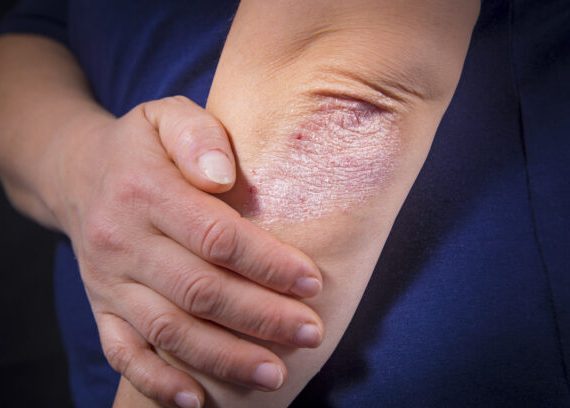

Psoriasis is a chronic inflammatory skin disease characterised by an accelerated TNF-/IL-23/IL-17 axis, hyper-proliferation, and aberrant differentiation of epidermal keratinocytes.
Psoriasis patients are frequently associated with obesity, diabetes mellitus, dyslipidemia, cardiovascular diseases, and inflammatory bowel diseases . Evidence suggests that obesity is a risk factor for psoriasis, aggravates existing psoriasis, and that weight reduction may improve the severity of psoriasis in overweight patients.
A variety of genetic and environmental factors are involved in the onset of psoriasis and its comorbidities. The environmental factors include dietary habits.
Studies revealed that psoriasis patients showed unbalanced dietary habits like higher intake of total fat, simple carbohydrates, and lower intake of proteins, complex carbohydrates, monounsaturated fatty acids, n-3 polyunsaturated fatty acids (PUFAs), vegetables, and fibre.
Certain nutrients or foods exacerbate psoriasis, such as saturated fatty acids (SFAs), simple sugars, red meat, or alcohol, while others, like vitamin D, vitamin B12, dietary fibers, and probiotics, can help in keeping your body healthy.
Vitamin D
There are two ways to meet vitamin D requirements in humans via dietary intake and via synthesis in skin by sun exposure. The food sources of vitamin D are cod liver oil, swordfish, salmon, tuna, sardines, beef liver, eggs, or cheese.
Exposure to ultraviolet B radiation (UVB) causes the production of up to 10,000 IU of vitamin D, whereas the recommended dietary allowance for adults over the age of 70 is 600 IU/day.
Vitamin D acts on monocytes and macrophages and down-regulates their production of TNF-, IL-1, IL-6, or IL-8. Also, topical vitamin D is effective for psoriasis because it inhibits keratinocyte hyperproliferation, reduces Th17 cell infiltration, and inhibits the expression of IL-12/23 p40, IL-1, IL-1, or TNF- in skin lesions.
Vitamin A
Vitamin A (retinol) is found in livers, fish, eggs, and butter, whereas provitamin A, such as -carotene, which is converted to vitamin A after intestinal absorption, is found in green or yellow vegetables such as carrots or spinach.
Dietary vitamin A is absorbed in the intestine and delivered mainly to the liver, and to a lesser extent, to the kidney, adipose tissues, or bone marrow . Most of vitamin A’s actions depend on its active metabolites, retinoic acid (RAs), formed in the target tissues through intracellular oxidative metabolism. Retinoids are highly effective in the treatment of psoriasis.
Retinoic acid acts on keratinocytes in psoriasis lesions to normalise the hyperproliferation and stimulate the terminal differentiation. In keratinocytes, retinoic acid inhibits TNF- production and lowers mRNA levels of inducible nitric oxide synthase.
Probiotics
When administered in adequate amounts, probiotics are living microorganisms that confer health benefits on the host. Most microorganisms used as probiotics belong to the lactic acid-producing genera Lactobacillus and Bifidobacterium. The administration of probiotics is supposed to have beneficial effects on psoriasis patients.
Low-Calorie Diet
Obesity is a chronic low-grade inflammation state and is associated with the incidence and severity of psoriasis. Thus, a low-calorie diet reducing weight may be helpful to improve psoriasis for patients with obesity.
AVOID THESE FOODS !
Alcohol
Psoriasis may be triggered or worsened by alcohol intake . Higher than average alcohol consumption is common among psoriasis patients. Alcohol may initiate or aggravate the inflammation in psoriatic skin lesions . TNF- production in monocytes and macrophages is increased by ethanol, as is lymphocyte proliferation and histamine release from mast cells.
Red Meat
Red meat (beef, pork) abundantly contains saturated fatty acids , inducing the NLRP3 inflammasome and IL-23/IL-17 pathway, and heme. It is thus found that the excessive intake of red meat may aggravate the inflammation in psoriasis via the effects of saturated fatty acids and heme.
Simple Sugars
The excessive intake of simple sugars like sucrose may exacerbate psoriasis.



